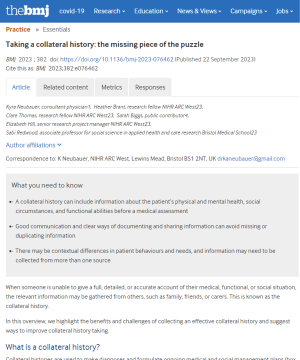Taking a collateral history: the missing piece of the puzzle
3 October 2023
The importance of taking a good collateral history to support clinical care is outlined in a new article published in BMJ Practice Essentials. A collateral history is information gathered from someone other than the patient, commonly family members, friends, carers or health professionals.
The article, written by Dr Kyra Neubauer, ARC West researchers and a public contributor, suggests collateral histories are commonly either not taken, or taken but not well recorded. The research team drew on evidence from a previous ARC West study exploring reasons for delays in hospital discharge.
A collateral history might include the patient’s physical and mental health, social circumstances, and functional abilities. Understanding what is ‘normal’ for the patient across these different domains is vital for making diagnoses and deciding ongoing medical and social management. Failing to collect it means the information is unavailable to all professionals involved in a patient’s care.
The most obvious time that a collateral history is important is when a patient is unable to provide the information themselves, for example for people living with dementia. However, information gathered from others can be just as helpful when it is used to add to or confirm the narrative provided by the patient, giving a broader picture of their circumstances.
The reasons for not collecting a collateral history are complex. They include:
- Lack of time
- Difficulty getting hold of family or friends
- A lack of value placed on collateral history compared to other sources of information
Other challenges to collecting a collateral history include:
- The potential for reporting bias
- Inconsistencies between different sources
- Health professionals worry they need to gain consent to take a collateral history, but as long as there are no concerns of potential abuse by the informant and no information about the patient is shared beyond the care team without consent, then there is no requirement for consent from the patient to gain collateral information
The authors also share some practical tips for improving the collection of collateral history, including:
- Ensure contact details for relatives and carers are kept up to date
- Establish a designated area in notes or IT systems for recording collateral history
- Use a template to prompt information collection
- The facility to update as needed
It is also important to raise awareness amongst patients and carers of the value of this information to their care. To support this awareness raising, the team created an animation and a template “Information About Me” form.
Dr Kyra Neubauer, Consultant Geriatrician and lead author of the article, said:
“Working for many years in the NHS I have frequently seen the results of poor care or inadequate discharge planning when collateral information is either not obtained or ignored. I really wanted to try and educate health care professionals and also the public as to the benefits of using collateral information to help in diagnosis and also the importance of seeing a patient in the wider context of their social environment which can help inform discharge.”
Paper
